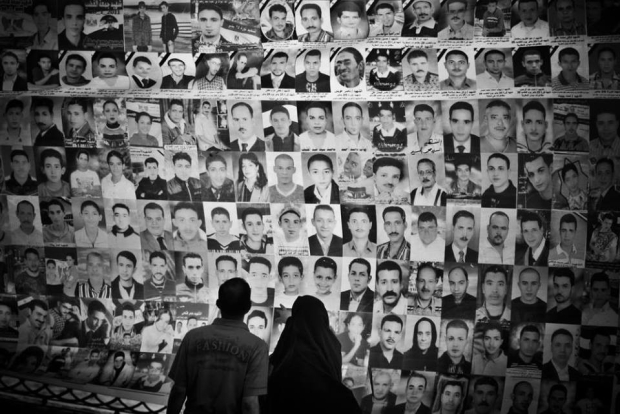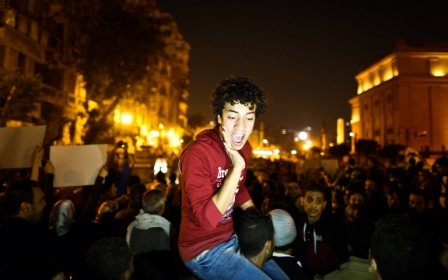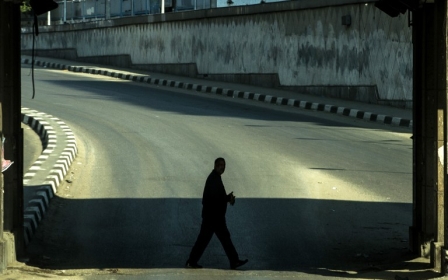In Egypt, the verdict is still out

“The final step of the program has been executed successfully. Call on the media informants and drummers, but oh, you the people, dare you not raise your heads again in front of your masters.”
So wrote the popular novelist Alaa Al-Aswany on his Twitter page on Saturday in a sarcastic response to the verdict dropping all criminal charges against Egypt’s former dictator president Hosni Mubarak for complicity in the killing of protesters during the country’s 18-day uprising nearly four years ago; an uprising that once inspired millions to the streets, and now just about draws thousands.
The Cairo court on Saturday dismissed murder charges against Mubarak, 86, and cleared his former interior minister Habib al-Adly, who oversaw Egypt’s police forces, and six aides. The question remains: if those who were in charge are not complicit, who killed the estimated 1,075 protesters who died across the country in the uprising that toppled Mubarak’s 30-year-rule on 11 February 2011?
It’s a question that the families of those who died would surely like answered. Egyptian novelist Ahdaf Soueif posted a poignant picture on her Twitter page of the many faces that have fallen in the course of Egypt’s uprising. She said, defiantly: “We will not forget. We will never let you go.”
So what does yesterday’s verdict show? It highlights a number of things: firstly, that the Egyptian army and government no longer fear public pressure. Where protests may have forced them to bow to the demands of the street in 2011 and 2012, this clearly appears no longer to be the case.
The army cleared the way for Mubarak to step down in February 2011 after millions of protesters camped out in streets across Egypt, and particularly in its epicenter of Cairo’s Tahrir Square, calling on the former president to step down. Some senior figures in the Egyptian military, particularly its chief at the time Hussein Tantawi, were known to be angry at the notion that Mubarak’s son, Gamal, was being groomed for the presidency and allegations of corruption amongst the ruling family.
The court also cleared Mubarak and his sons of corruption charges, though it is unclear when Mubarak will be released since he is still serving out a prison sentence against the misuse of public funds, which is due to end soon.
After six days of street battles in November 2011, known as the street battle of Mohamed Mahmoud that killed 51 people, the Supreme Council of the Armed Forces, which took over running the country after Mubarak’s ouster, also bowed to street pressure to create a fixed timetable for the handing over of power. It eventually did in late June 2012 in the country’s first ever democratic presidential elections. That elected president, Mohahmed Morsi, was ousted in a popularly-backed military coup one year later. He remains in jail.
In June 2012, Mubarak was sentenced to life in prison after a court convicted him on charges of complicity in the killing of protesters during the 18-day uprising. That was during a political climate of elections and ongoing street mobilisation.
Fast forward a year, and ever since 30 June 2013, the balance of power has tipped favorably towards the army, police and judiciary – the three arms of the state seen by many of the young activists that galvanised street protests in 2011 as the repressive tools of the regime.
The military has given itself broad powers to guard all public properties. To date, no police officers have been sentenced for the killing of protesters, and they remain out in full force across the country. On Saturday, they blocked the entrance into Tahrir Square to the over 1,000 protesters that bravely went out to demonstrate against the verdict. Meanwhile, many of the young activists that led demonstrations in 2011 are now in jail, or in exile.
A controversial Protest Law, issued in November 2013, bans all but police-sanctioned protests and gatherings of more than 10 people in a public space. Gone are the days when you could go down to Tahrir Square and freely hear people gathered in scores, talking politics and hanging effigies of whoever they saw fit to accuse of oppressing them. At one time, that included Mubarak too.
Secondly, for anyone who had any remaining doubts about which side the army stood on: the old regime, or the young revolutionaries – both Saturday’s verdict and the events following 30 June 2013 that also killed over 1,000 demonstrators – confirm that it is the former.
Egypt’s current president Abdel Fattah el-Sisi, who was head of the country’s powerful military intelligence during the 18 day uprising, reportedly told detainees at the time that they “should respect Hosni Mubarak and the military leadership” and the protesters should return to their homes “and leave Tahrir Square”.
The military has always acted in its own self-interests and the current balance of power - young revolutionaries and Islamists in jail, and Mubarak’s return to an army hospital yesterday amidst jubilation - reflect the status quo they are keen to maintain.
Thirdly, Saturday’s verdict shows, almost predictably, how unsuccessfully the country’s 18-day uprising has proceeded since many protesters handed over power to the army both at the end of February 2011, and on 30 June 2013, including Alaa al-Aswany in the case of the latter, seeing the army as their savior.
Egypt’s human rights standards have only gotten worse nearly four years on from the initial uprising, freedom of expression is severely restricted, and while the country may have economic projects on the go and the promise of returning investments, the extent to which economic gains can placate people remains to be seen. Egypt’s economic growth was being praised by the international community just months before the country erupted in a once-hopeful uprising.
The question of who killed the protesters of the 18 days, of which only 239 were actually considered in Saturday’s case, remains open. The verdict was made on a technicality and is being appealed by the country’s prosecutor-general. If the case goes to the Court of Cassation, and the verdict is not ratified, then it could be reviewed by a criminal court with full investigative powers. The verdict on that is still out.
- Nadine Marroushi is a British-Palestinian journalist who has worked for Bloomberg and the English edition of Al-Masry Al-Youm (also known as Egypt Independent), and as a freelance journalist has written for The National newspaper in the UAE, and the London Review of Books blog. She has also been published by the Financial Times, and other international publications.
The views expressed in this article belong to the author and do not necessarily reflect the editorial policy of Middle East Eye.
Photo credit: Egyptian police officers stand in front of the police academy in Cairo during the trial of Egypt's former president Hosni Mubarak on Saturday (AFP)
Stay informed with MEE's newsletters
Sign up to get the latest alerts, insights and analysis, starting with Turkey Unpacked
Middle East Eye delivers independent and unrivalled coverage and analysis of the Middle East, North Africa and beyond. To learn more about republishing this content and the associated fees, please fill out this form. More about MEE can be found here.






